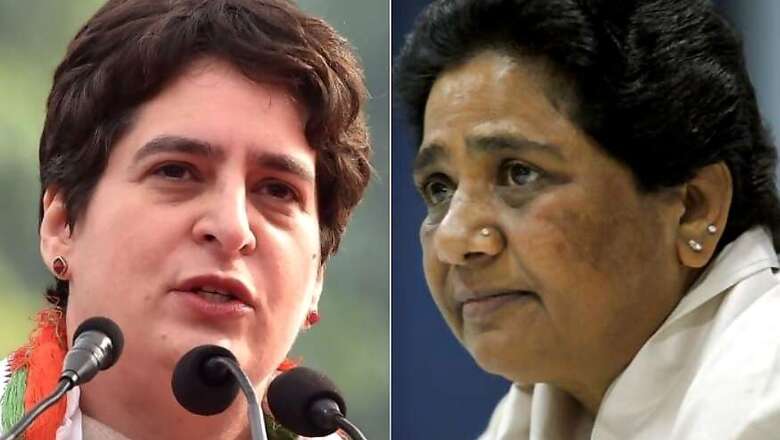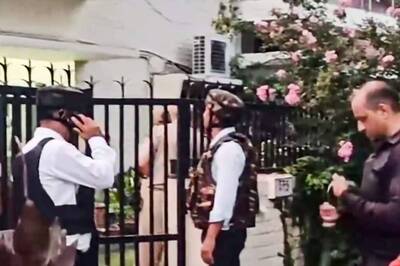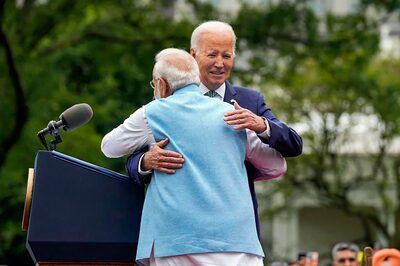
views
With less than two years to go for the electoral battle of Uttar Pradesh, the political landscape is witnessing an ever-increasing war of words between Bahujan Samaj Party (BSP) chief Mayawati and Congress general secretary in charge of the state Priyanka Gandhi Vadra. The latest episode was the attack and counterattack between the two over the India-China border conflict.
So why is this the case? Why is Mayawati seemingly sharper in her attack on the Congress than the Bharatiya Janata Party (BJP), which is in power both in the state as well as the Centre? Why do the two parties in opposition seem eager to settle scores, rather than joining in their criticism against the BJP?
The answers lie in the political realities on the ground, shifting caste loyalties and desperation to protect the social electoral base or else recapture the lost one.
THE MIRROR IMAGE PHENOMENON
Historically in its evolution, the BSP might have been a phenomenon of Dalit political aspirations and social emancipation, but it gradually moved towards the larger rainbow coalition of Dalits, Muslims and upper-caste Brahmins. It was an experiment that became well-defined in it’s 2007 assembly election slogan of “Hathi nahi Ganesh hai...Brahma-Vishnu-Mahesh hai”. It was this formula that saw the BSP reach the zenith of its political power and go on to form a government with full majority of its own.
This Muslim-Dalit-Brahmin (MDB) formula was a mirror image of what had been the Congress’s electoral formula for long since India’s independence and right till late the 1980s when rising Dalit consciousness, backward caste resurgence—the Mandal politics and rising Hindutva— that is the Kamandal wave, withered it away. Dalits shifted towards the BSP, Brahmins largely towards the BJP and Muslims tended to side mostly with the backward caste-based Samajwadi Party. However, they also often looked towards the BSP, in their search of a counter-BJP force.
Dr Prashant Trivedi of Giri Institute of Development Studies says, “In this mirror image phenomenon the only difference between the two parties was of the leadership. While in the Congress it was the elite Brahmin or upper caste who led this social combination, in the BSP it was the Dalit leadership that was at the top.”
So is the BSP now concerned that a seemingly more assertive Congress under Priyanka Gandhi Vadra can disturb its caste base in UP? Should the Congress’s strong assertion in the case of the Sonbhadra massacre, where Dalit tribals were killed or most recently its major intervention on the issue of migrant labourers — a majority of them being from marginalised Dalit background — be seen as its effort to reclaim lost ground?
In looking for an answer to this question, it should be kept in mind that barring UP, the Congress has been able to protect its Dalit base in most other states like Rajasthan, Madhya Pradesh, Punjab and Maharashtra, where the BSP had failed to make any serious impression in the more than 35 years of its existence.
“The BSP chief has strong reasons to be concerned. At the moment her priority is to protect her traditional Dalit vote bank. If the Congress is able to do its homework well and prepare a strong organisation in Uttar Pradesh, it can again be a force to look up to for the Dalits. The feeling of sharp repulsion to the Congress has been diluted to an extent over the period of the past 30 years,” says Dr Trivedi.
THE MINORITY QUESTION
Ever since the late 1980s, as the Ram temple movement and aggressive Hindutva politics gained pace, Muslims in Uttar Pradesh have generally considered the SP as the party of their first preference. The Muslim-Yadav (MY) factor had been a strong base for the party. For Muslims, the BSP had always been a subject of doubt. This because the party had not been shy of sharing power with the BJP, three times, having formed a coalition government with it, between 1995 and 2000.
Despite this, they had sometimes looked towards the BSP, for example in 2007, when its formula of social engineering looked promising against the BJP, or in different Lok Sabha polls wherever it seemed in a position to defeat the BJP.
However, since 2017, the BSP’s tryst with minority politics seems to have been a disaster. Despite fielding 98 Muslim candidates in the 2017 state polls, the party ended up with just 19 MLAs in the Vidhan Sabha. The allegation was that by fielding so many Muslim candidates, the BSP actually set the table for the BJP, by assisting the latter in communally polarising the elections.
Political observer Professor Sudhir Pawar says, “First the 2017 election strategy and then her decision to call off the Mahagathbandhan immediately after the 2019 general elections have not gone down well with the minorities. No doubt the alliance failed to deliver the electoral result as expected, but it was a promising, strong caste combination of Dalits, Backwards and Muslims that would have gained strong roots and become a formidable force against the BJP in the time to come. Mayawati’s decision to call off the alliance and pin the blame of defeat on the Samajwadi Party and its leader Akhilesh Yadav has been largely perceived to be taken under the BJP’s pressure, and this has alienated the Muslims from the BSP."
Probably the BSP fully realises this changed political reality and, therefore, now has no strong reason to be shrill against the BJP.
POLITICS OF COMPULSIONS AND FINDING NEW SPACE
As experiments of social engineering continue to fail for the BSP since the past decade, it’s now probably resorted to politics of compulsions and fighting for survival amid existing realities. Senior journalist Brijesh Shukla points out two factors.
He says, “By attacking the Congress and being with the BJP on issues ranging from triple talaq to Kashmir and now the India-China border dispute, Mayawati seems to have earned relief on the personal front. The ED probe in the Rs 1,400 crore memorial scam and other matters don’t see much heat.” So when Priyanka Gandhi Vadra indirectly hit out at Mayawati by saying “Some opposition leaders are behaving like spokespersons for the BJP”, she was probably referring to this long saga of BSP-BJP bonhomie.
The second factor is finding new political space. The 2017 and 2019 elections have seen the BJP cementing its caste combination of upper castes, most backwards and non-Jatav Dalits. “With Muslims being alienated, a strong section of the Dalit vote bank being lost, Mayawati might like to say what will be appreciated by this segment of voter and will suit the BJP," says Shukla. "Hence more attack on the Congress”.
Caught amid these diverse aspects of the mirror image phenomenon, the Muslim angle, politics of compulsions and effort to find new space, the political war of words between the BSP and the Congress will only intensify in the run-up to the assembly polls in 2022



















Comments
0 comment